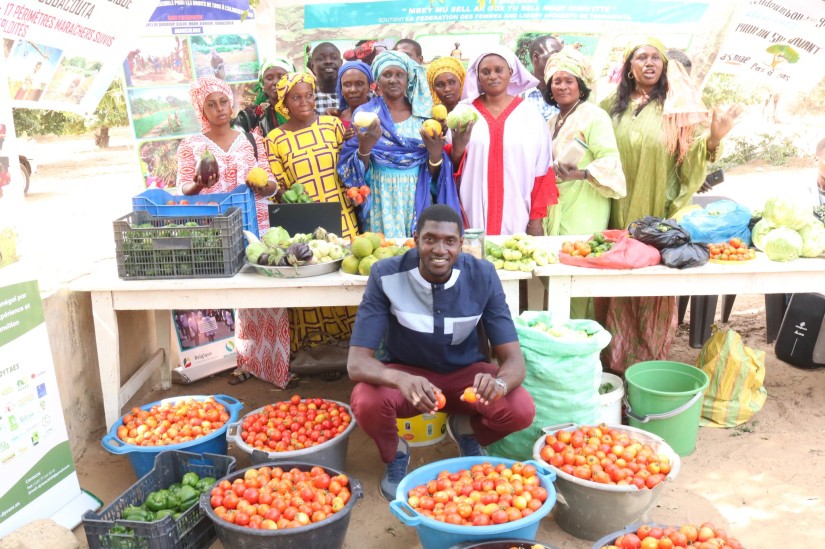Senegal
Samen met drie partners hebben we een agro-ecologisch programma uitgewerkt in Senegal. Zo ondersteunen we de landbouw van 64 basisgroepen in de regio Fatick.

Good agroecological news from Africa, where we are working in Burkina Faso, Mali and Senegal. The Alliance for the Food Sovereignty of Africa (AFSA), with more than 30 civil society groups from 50 African countries, is rallying behind the mission to make African agriculture agroecological. Following the November Climate Summit (COP27), the AFSA therefore formulated six recommendations.

According to recent FAO reports, global hunger and food insecurity have continuously risen since 2014.[1] Deforestation, ongoing conflicts, unprecedented biodiversity loss and marginalisation of small farmers and peasants have contributed to a global food system failure.
In April, Viva Salud, KIYO and Solidagro brought together their partner organizations from Morocco, Mali, Burkina Faso, Senegal, DR Congo and Burundi in Senegal for an exchange on the strategy and good experiences of each in the defence of the rights of all.
We started by exchanging the specificities of our approach, the rights-based approach, by sharing experiences from the field. Each country presented the pillars that seem to be the most important.
Senegal staat bekend als één van de stabielere landen in West-Afrika. Toch klinkt er de laatste jaren steeds meer kritiek. Journalisten en oppositiestemmen botsen geregeld op beperkingen, en ook rond verkiezingen loopt de spanning soms hoog op. De democratische reputatie van het land staat daardoor onder druk.
Landbouw onder invloed van de industrie
Op het vlak van landbouw en voedselzekerheid kiest de Senegalese regering vooral voor een industrieel model. Dat betekent: grootschalige teelten, kunstmest en pesticiden, en steeds vaker ook genetisch gemodificeerd zaaigoed. De haven van Dakar is de poort waarlangs de meeste van deze producten het land binnenkomen.
Senegal blijft daarnaast sterk afhankelijk van ingevoerd voedsel, vooral rijst en graan. Dit maakt het land kwetsbaar voor prijsstijgingen op de wereldmarkt en versterkt de afhankelijkheid van buitenlandse bedrijven.

Tegelijk groeit het besef dat een ander landbouwmodel nodig is. Boeren, onderzoekers en middenveldorganisaties zetten zich steeds meer in voor agro-ecologie: landbouw die beter aansluit bij lokale omstandigheden, respect heeft voor bodem en water, en meer inzet op biodiversiteit.
In de regio Fatick bestaat zelfs een plan om tegen 2035 een volledig agro-ecologisch gebied te worden. Daar werken boeren en gemeenschappen samen om minder afhankelijk te zijn van chemische inputs en om beter bestand te zijn tegen droogte en klimaatverandering.
Belangrijk in Senegal is (net als elders) het bewaken van de democratische ruimte: kunnen gemeenschappen en organisaties vrij meedenken en meebeslissen over hun voedsel en hun land? Zonder die vrijheid blijft verandering kwetsbaar.
Met drie partners ondersteunen we landbouwactiviteiten op het platteland. De partners geven technische vormingen over agro-ecologie, sensibiliseren rond drinkbaar water, doen investeringen en beïnvloeden het beleid. Je leest hieronder meer over het werk per partner.
We zijn actief in de regio Fatick, gelegen in het zuidwesten van het noordelijke deel van Senegal. Ons programma ondersteunt er de landbouwactiviteiten van 64 basisorganisaties in vier gemeenten, met een bevolking van 60.000 personen of 7.200 gezinnen. De basisorganisaties zijn gegroepeerd in federaties, die organisatorisch ondersteund worden door de partners.
Een voorbeeld van zo'n federatie is de vrouwenfederatie van Toubacouta. Ze doet vormingen in de verwerking van groenten en fruit, productiemethoden van eigen zaaigoed en andere landbouwtechnieken. Daarnaast eisen de verenigde boerinnen hun recht op grond op bij de lokale overheden, zoeken ze organisaties die hen financieel ondersteunen en vormen ze een belangrijke gesprekspartner wanneer het gaat over groenteteelt in Toubacouta.